If you’re buying property near the sea on Costa Blanca, read this, and consult a lawyer before signing anything.
Our partner lawyer recently saved an international buyer whose dream villa was flagged under Spain’s Ley de Costas (Coastal Law)—facing potential demolition risks, restricted ownership, and concession-only rights.
In this case, although physically appealing and well-priced, the concession duration was only 30 years with no guaranteed renewal. Potential expenses, legal uncertainty, and possible demolition pushed the buyer to withdraw. This real case should serve as a strong cautionary tale.
With their permission, we now share this story to help you avoid the same fate.
What Is Spain’s “Ley de Costas” and Who Is Affected?
Spain’s Ley 22/1988, later modified by Ley 2/2013, defines the Dominio Público Marítimo‐Terrestre (DPMT)—the public maritime-terrestrial domain including beaches, dunes, and foreshore. The goal: to preserve the coastline as a public asset, ensure sustainable use, and prohibit uncontrolled private development .
Key Coastal Zones
- Dominio Público Marítimo‑Terrestre (DPMT)
- Includes the seashore, dunes, reclaimed land, and floodplain.
- Private ownership is replaced by temporary administrative concession.
- Servidumbre de Protección (Protection Easement)
- A protected strip of at least 100 m, up to 200 m from the shoreline.
- No new construction. Existing structures can be maintained but cannot increase in height, footprint, or volume.
- Servidumbre de Tránsito (Transit Easement)
- A minimum 6 m pedestrian corridor next to the sea is reserved for public access and emergency vehicles.
- No fences or private obstructions allowed.
- Zona de Influencia (Influence Zone)
- Extends to 500 m inland. Urban planning must prevent high-density development and architectural barriers in this area.
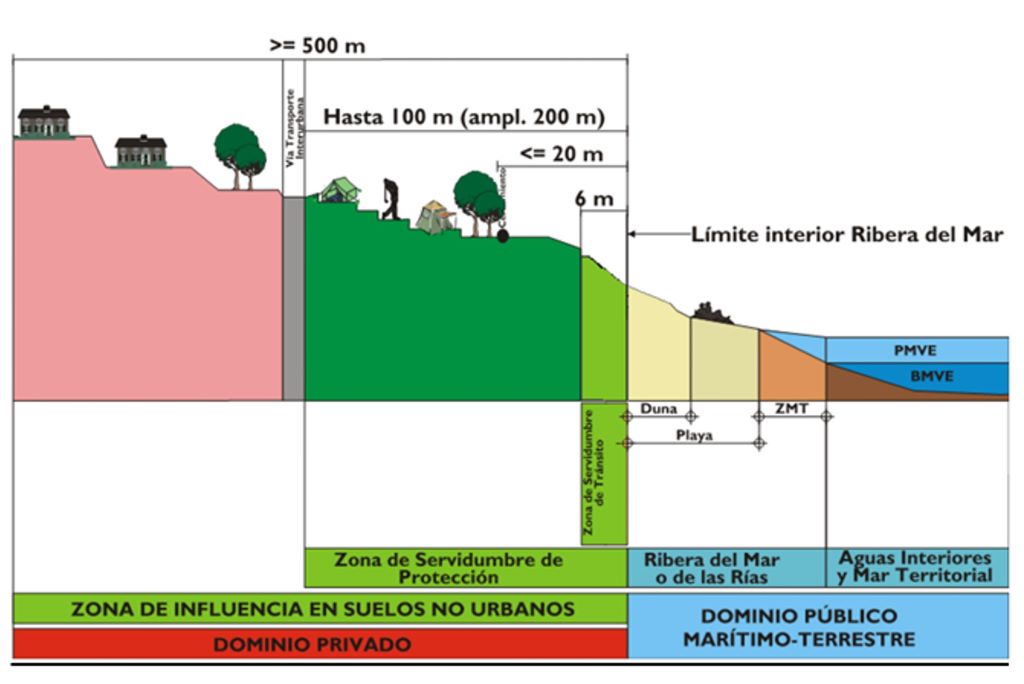
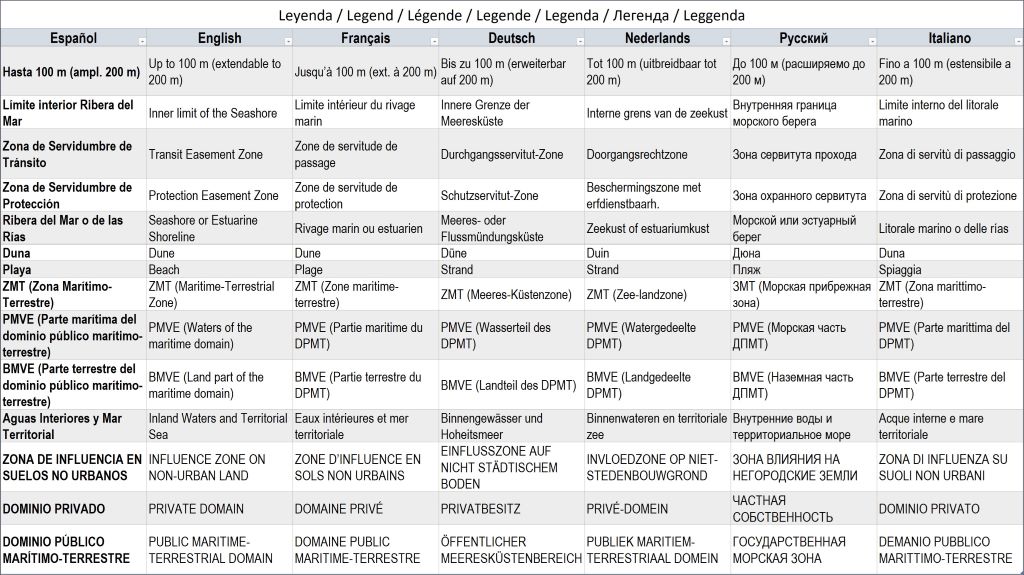
Bottom line: if your property falls within these zones, you’re no longer a full owner—you reconfirm your right as a concessionaire under strict regulation.
What Kind of Properties Fall Under These Restrictions?
Any structure on the DPMT is impacted: villas, apartments, beach bars, marinas, and reclaimed land. Even if once legally built (before the Law), these fall under concession: not indefinite property rights, but a temporary usage permit.
This includes:
- Homes of any type (apartments, villas, etc.) on beaches, dunes, marshland.
- Land that was “gained from the sea”.
- Any structure built illegally in the past but later regularized (some 12,800) homes were regularized under the 2013 reform.
How Coastal Concessions Work – Timeframes, Fees, Conditions
- Administrative Entity
- Concessions are granted by Spain’s Ministry for Ecological Transition (MITECO). The process requires public notice, environmental assessments, and technical documentation.
- Concessions are granted by Spain’s Ministry for Ecological Transition (MITECO). The process requires public notice, environmental assessments, and technical documentation.
- Time Limits
- Villas and permanent buildings: Up to 50 years.
- Environmental or conservation works: Up to 75 years.
- Temporary/demountable installations: Maximum 30 years.
- Conditions & Fees
- Approval comes with usage conditions, climate safeguards, and maintenance obligations.
- An annual canon (fee) is charged to concession-holders. This is not a tax, but payment for use of public land.
- Lease Expiration & Demolition
- At the end of the concession, the building must be demolished, and the land restored to natural condition.
- No automatic compensation unless otherwise stated in the concession.
- Concession Extensions Allowed?
- The 2013 update allows one-time extensions, but legal and environmental conditions must be met. The absolute maximum is 75 years.
Costa Blanca: Local Municipalities Under Coastal Regulation
Coastal Law Applies Across All Spanish Coasts, Including Costa Blanca.
Alicante city, Dénia, Jávea, Calpe, Altea, Benidorm, Villajoyosa, El Campello, Santa Pola, Guardamar, Torrevieja, Orihuela Costa, you name it! They are all under the same DPMT framework . However, inclusion in the DPMT depends on official delimitation (deslinde).
After deslinde, any home classified within these zones must follow concession rules. Buildings just outside the limits face fewer restrictions—but urban planning must still comply with coastal protection goals.
Local councils cannot override it, though they may assist with coastline mapping and enforcement.
How Coastal Restrictions Impact Property Value & Financing
Price Reductions
- Concession properties often sell 30–50% cheaper due to demolition risk and legal limitations.
Financing Limitations
- Banks are often reluctant to grant mortgages for concession-based properties, making it harder to finance the purchase.
Legal Uncertainty
- A concession may expire without renewal, leading to demolition.
- Buyers and lenders discount this risk in price .
Demolition Numbers & Affected Homes
- 12,800 homes on public land were regularized under the 2013 reform .
- 140,000 additional structures were amnestied for illegal works under earlier rules .
- Demolitions depend on administrative delimitation and expiry dates; once a concession ends without renewal, the structure must be torn down—unless a new law intervenes.
Compensation Rights: What You Need to Know
- No automatic compensation is provided at expiry or demolition .
- The European Parliament has urged Spain to indemnify property owners at fair market value, but Spanish law does not yet mandate this .
- Compensation is only possible in rare cases—such as early expropriation for public interest, but these are not common.
Why You Must Take This Seriously Before Buying Property Near the Sea on Costa Blanca
Warning: Properties Built Before the Coastal Law May Not Show Affectation in Official Documents
The Coastal Law, introduced in 1988 and amended in 2013, established strict regulations and public domain boundaries along the Spanish coastline.
However, for properties constructed before these laws, the affectation is not always reflected in the Land Registry – unless the official demarcation (deslinde) has been registered or communicated by the authorities.
As a result, the absence of any mention in the registry documents does not guarantee that the property is free from Coastal Law restrictions.
Buyers must exercise extreme caution. If you purchase a beachfront property and later discover it is subject to the Coastal Law, you will generally have no right to claim damages from the seller—unless you can prove that the seller acted in bad faith and deliberately concealed this information, which is difficult to demonstrate in practice.
Recommendation:
Always hire a qualified lawyer to carry out thorough due diligence before buying any coastal property. Your lawyer shall check not only the Land Registry but also consult the relevant Coastal Demarcation Office to confirm whether the property is affected by the Coastal Law. This precaution is essential to avoid unexpected legal and financial consequences after your purchase.
Essential Pre‑Purchase Steps on Costa Blanca’s Coast
- No matter if you buy directly from a property owner or through a Realtor, hire a lawyer or a Notary with expertise in coastal law. They can interpret maps, deslinde data, and concession records.
- Verify official coastline delimitation (deslinde) via MITECO or coastal municipalities.
- Request concession documentation: duration, canon, renewal terms, and legal status.
- Check planning and environmental clearances to ensure permits were correctly processed.
- Assess longevity: ensure concession matches your investment timeline. If correctly priced, it can still be interesting.
- Evaluate financial implications: calculate any demolition cost, restoration, and insurance gaps.
FAQs from those Buying Property Near the Sea
Purchasing or owning a beachfront villa on the Costa Blanca doesn’t guarantee freehold. If within DPMT or easement zones, ownership is a concession—with expiry and demolition risks. Always verify status legally before purchase.
Yes. Concession expiry—typically up to 50–75 years—triggers mandatory demolition unless formally renewed. Compensation isn’t automatic.
Consult MITECO’s deslinde maps and municipal records. Your lawyer should confirm mapping and concession history.
Yes, but not always. Ley 2/2013 allows a one-time extension if current urban and environmental standards are met, but total duration cannot exceed 75 years.
If the property is within the Dominio Público Marítimo‑Terrestre (DPMT), expect a significant discount of 30–50%, and most banks will limit or refuse loans due to the demolition risk and legal insecurity. And remember, you buy the concession, not the full ownership.
Key Takeaways—Why Legal Guidance Is Vital when Buying Property near the Sea on Costa Blanca
- Coastal homes (especially pre-1988) may not show restrictions in Registry; always verify.
- Ownership: limited to a temporary concession, not freehold.
- Concession status influences mortgage availability, investment value, and demolition risk.
- Expiry without renewal leads to demolition with no compensation.
- These rules apply to all coastal municipalities across the Costa Blanca and throughout Spain.
- Legal due diligence is essential: check records, concession terms, and risks with an expert.
📣 Call to Action for those buying property near the Sea on Costa Blanca
- Found this article eye‑opening? Share it with your expat network to warn them and avoid unpleasant surprises.
- Need guidance on buying a property in Spain? Check our cheat-sheet with step-by-step instructions and useful tips 👉.
- Have a specific case or legal wrinkle you want us to explore in more depth? Leave a comment below—we’ll collaborate with our legal advisors to provide a new, dedicated article.

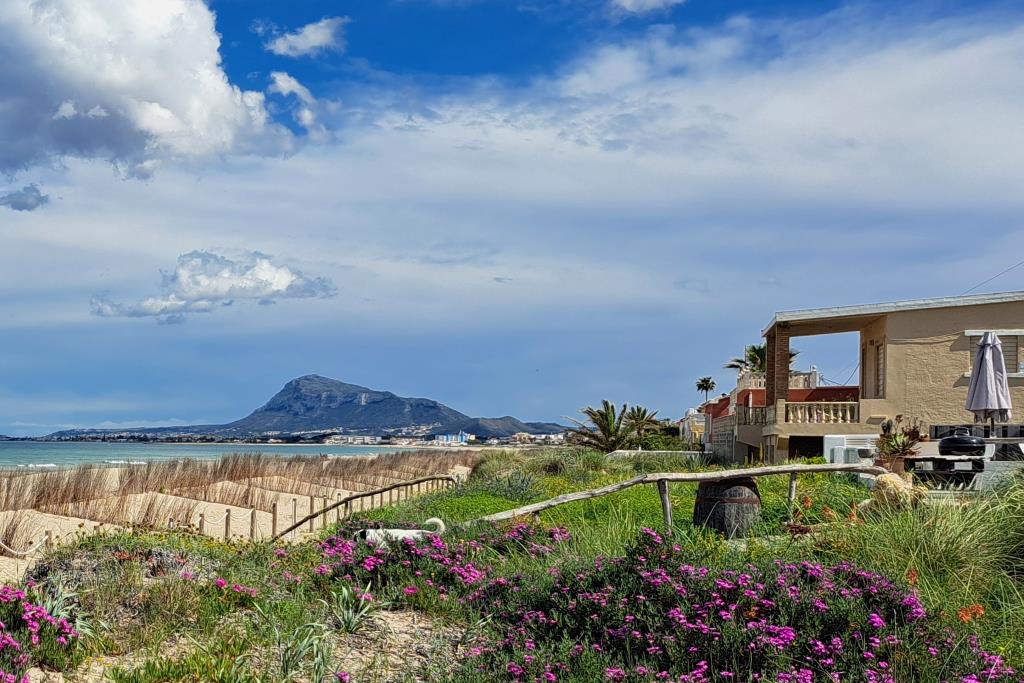
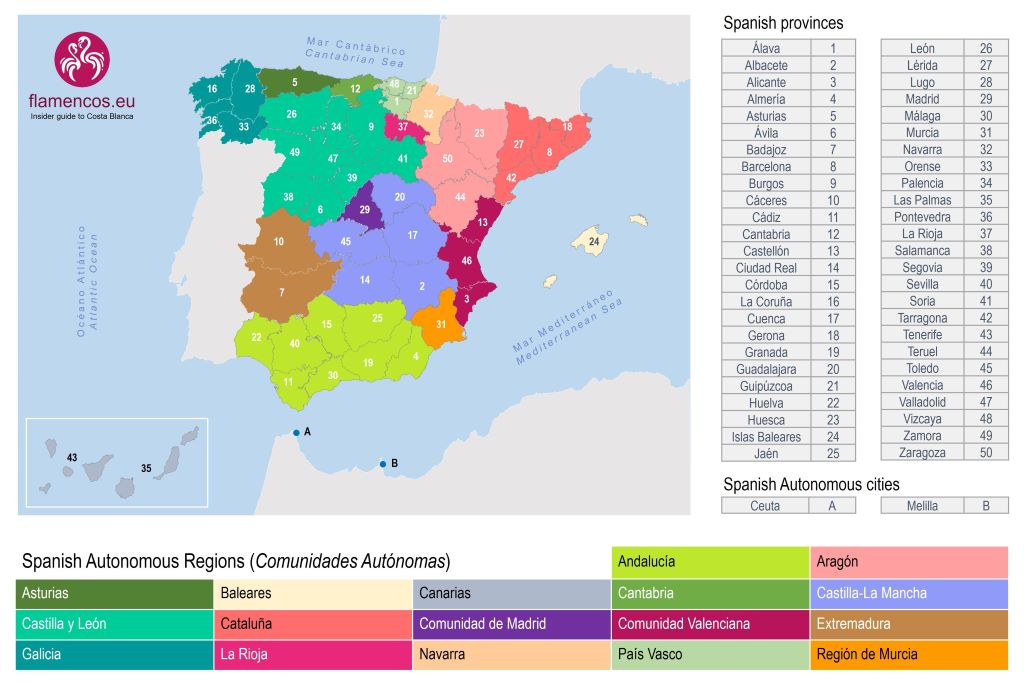
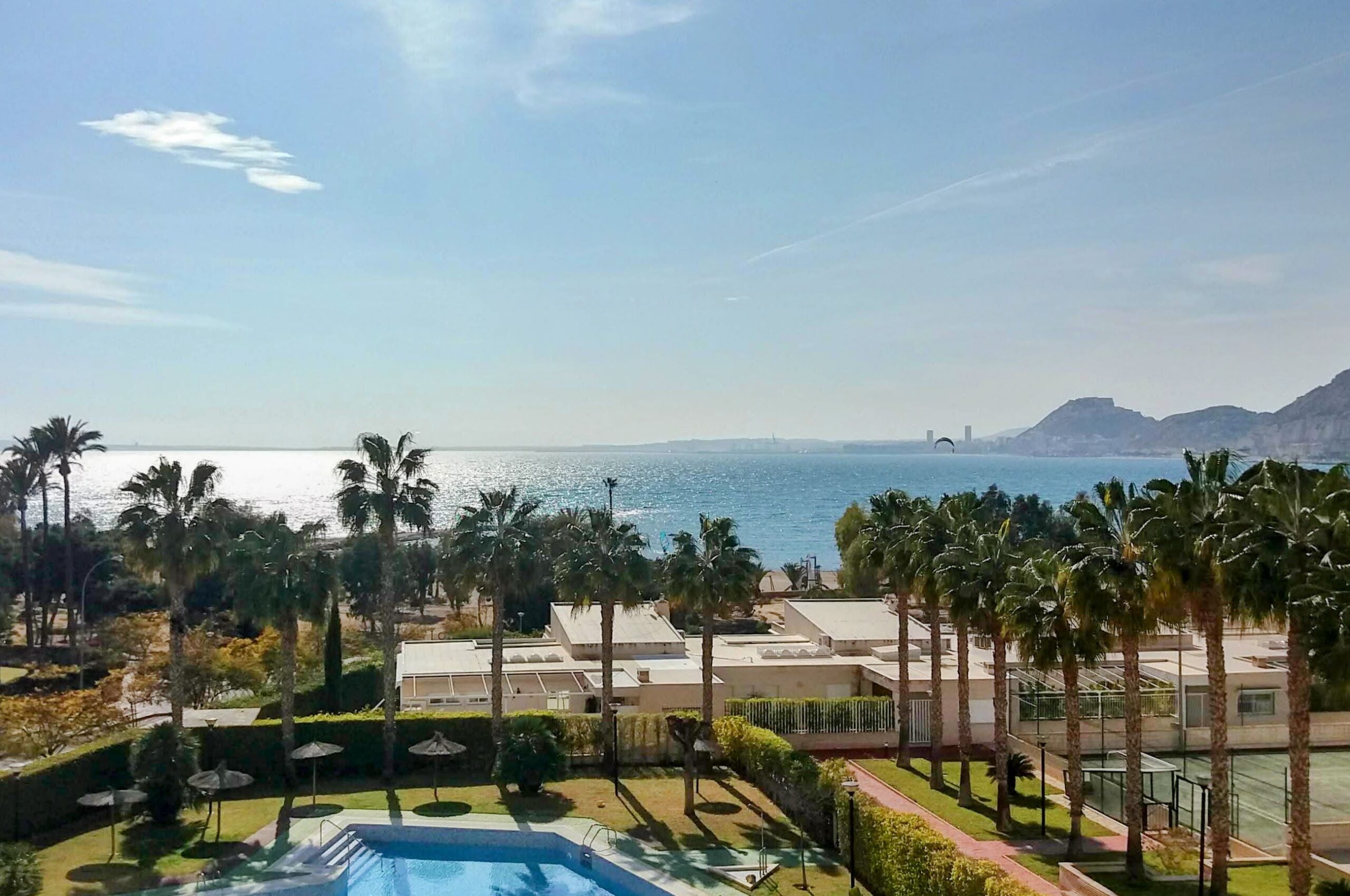



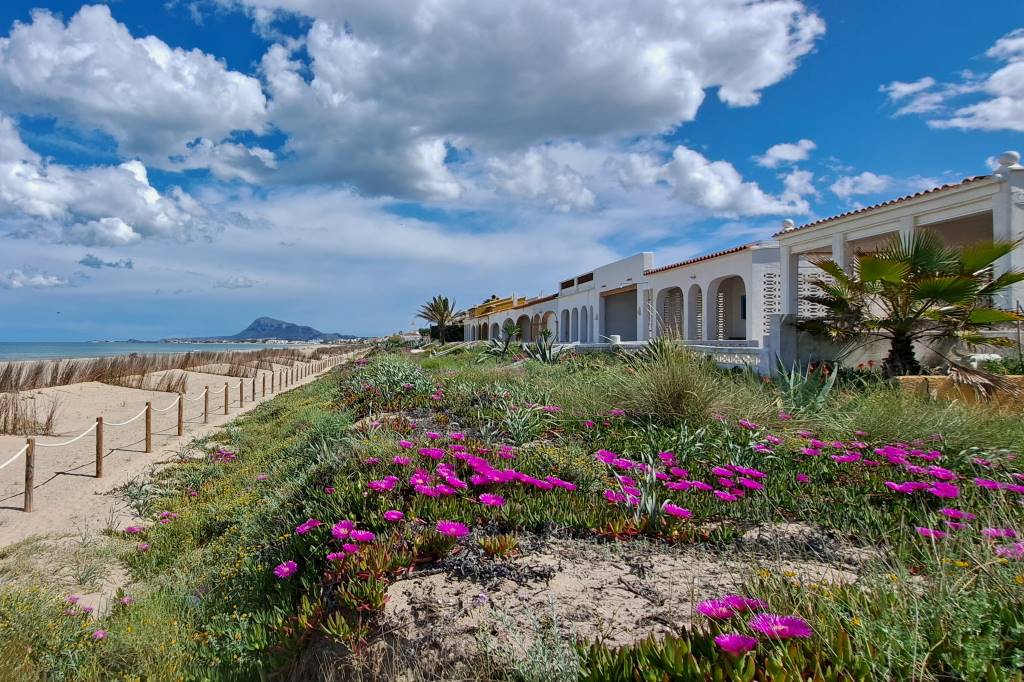

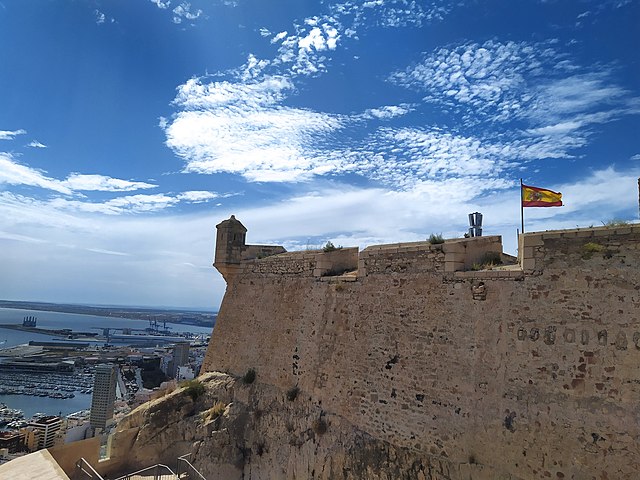

Leave a Reply
You must be logged in to post a comment.